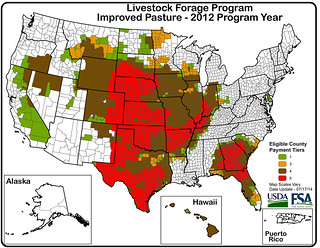Don’t miss deadline for maximum grazing disaster relief
Farm Service Agency will pay 1, 3, 4 or 5 times the base rate depending upon the severity of the drought in a given area. Every Arkansas county was affected in 2012. (Image courtesy Farm Service Agency)
September 5, 2014
(233 words)
PINE BLUFF, Ark. – Livestock producers who lost money due to droughts or fires between October 2011 and 2013 could be eligible to receive recovery assistance money through the Livestock Forage Disaster Assistance Program.
However, producers should hurry to file a claim as congressional budget cuts will reduce the amount of money paid to producers after Sept. 30, said David Fernandez, Cooperative Extension Program livestock specialist, at the University of Arkansas at Pine Bluff.
Even if farmers cannot complete the paperwork before the deadline, simply registering for the program will preserve eligibility for full payment under the current funding plan, he said.
In the past, producers and ranchers would have had to applied for the Noninsured Crop Disaster Assistance Program to be eligible for assistance, but the 2014 Farm Bill eliminated that restriction, Fernandez said.
Livestock producers can register at their local Farm Service Agency, or FSA, office or online at http://www.fsa.usda.gov/disaster-register. Once registered, the county FSA office will contact you to complete the application, which must be completed by Jan. 30, 2015.
Pursuant to 7 CFR § 15.3, the University of Arkansas System Division of Agriculture offers all its Extension and Research programs and services (including employment) without regard to race, color, sex, national origin, religion, age, disability, marital or veteran status, genetic information, sexual preference, pregnancy or any other legally protected status, and is an equal opportunity institution.
By Carol Sanders, writer/editor
UAPB School of Agriculture, Fisheries and Human Sciences
(870) 575-7238
sandersc@uapb.edu
Related Links
